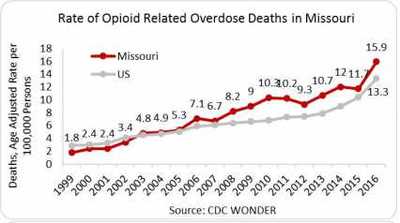The most recent data is in from the National Institute on Drug Abuse (NIDA), and it’s not good news for Missouri residents. Not only have synthetic opioid overdose deaths undergone a significant increase in recent years, but the rate of opioid-related overdose deaths in Missouri exceed the national average. Here’s a closer look at the data, along with what it means for addicts and the people who love them.

Missouri has many allures, but high addiction rates are not one of them.
Staggering Statistics
There’s an opioid epidemic raging throughout the country. Unfortunately, the people of Missouri are among the hardest hit, according to NIDA data. Just how troubling are the findings? The numbers speak for themselves.
For starters, there were 914 opioid-related overdose deaths in the state in 2016 alone. This is a rate of 15.9 deaths for every 100 people (compared to a national rate of 13.3 deaths per 100,000 persons). Since 2013, meanwhile, the number of synthetic opioid overdose deaths spiked from 97 to 441.
The phenomenon isn’t limited to illegal drugs, either. In fact, Missouri providers wrote a whopping 5.2 million prescriptions in 2015—that’s 90 opioid prescriptions per every 100 people. Meanwhile, the average, countrywide rate was 70:100.

Nor is the impact of the opioid epidemic limited to addicts themselves. According to a CDC study reported by NIDA, the number of codes reported by hospitals related to neonatal abstinence syndrome (NAS) linked with maternal drug increased fivefold over the decade between 2006 and 2016.
Given the skyrocketing use of these dangerous drugs, it’s not surprising that Missouri is also seeing rising incidences of both HIV and hepatitis C prevalence and diagnoses linked with injection drug use. It’s also not surprising that the Missouri Department of Health and Senior Service (DHSS) has established fighting the opioids crisis as a critical priority.
Where There’s Help, There’s Hope
For people addicted to opioid drugs—and for the people who love them—the outlook can seem bleak. But it doesn’t have to be that way.
Essential to getting addicts the help they need is letting go of the stigma associated with substance abuse. This is easier to do when we accept that addiction can and does strike people from all walks of life. Proposes MDHHS, “the opioid epidemic affects all genders, all races, and many age groups in both rural and urban Missouri geographies. The impact is multi-dimensional and multi-generational. Trends indicate that the scourge of misuse in our state, and nationwide, continues to affect people across all demographics.”
And the evidence shows us that recovery from drug addiction, is possible, especially through treatment including behavioral counseling, medication, the use of medical devices and applications for addressing withdrawal symptoms, evaluating and treating co-occurring mental health issues, and relapse prevention through long-term follow-up.

Addiction fractures families, but substance abuse treatment can help put them back together
But not all addiction treatment programs are created equal. Says the NIH, “A range of care with a tailored treatment program and follow-up options can be crucial to success. Treatment should include both medical and mental health services as needed. Follow-up care may include community- or family-based recovery support systems.”
And yet, according to SAMHSA’s National Survey on Drug Use and Health as reported by NIDA, just 2.6 million of the 22.5 million aged 12-or-older Americans—just 11 percent!—who need treatment for drug or alcohol use actually receive treatment through specialty treatment programs. The takeaway? When avoiding becoming a statistic may depend on treatment, shockingly few people are getting it.
Contact us at Harris House today to learn more about our St. Louis area treatment programs aimed at helping people overcome their addictions in order to lead productive, fulfilling and substance-free lives.







